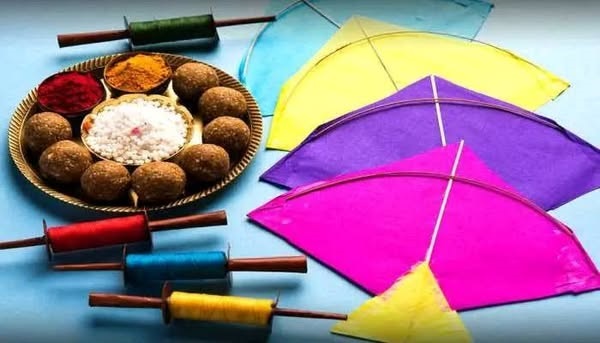
The first major festival in the first month of the New Year is Makar Sankranti, which falls on January 14 and is celebrated across India, albeit with a slightly different touch in each State. In Gujarat the day is celebrated by flying kites and called ‘Utaraan’ (Utraan). Children, men and women, all are seen engaged in flying colourful kites on the grounds or from the terraces of their homes. In Gujarat, Goa and Maharashtra, the day also marks the beginning of marriage season as the auspicious period starts with the Sun’s shifting or transition from the Dhanu rashi to Makar rashi, hence Makar Sankrant.
In Goa and Maharashtra, a common ritual called Haldi Kunku is being celebrated by married women wherein they visit each other’s homes and exchange Tilgul, laddoos and gifts. A lot of commercial activity happens in the one month duration beginning from January 14. Women wait eagerly for Makar Sankrant to come, as they can dress in their best attires for the entire month and visit each other’s homes to participate in the Haldi Kunku ceremony.
The markets are full of attractive gifts that are purchased in bulk by women to give away and the shops in the city markets are already witnessing footfalls for bulk purchases. Colourful clay pots called sugad and budkulo, coconuts, tilgul, roasted grams, sesame-jaggery ladoos and gifts are exchanged during the Haldi Kunku celebration. The ritual has taken the form of a community festival too, celebrated by the women in residential colonies and societies or even on public platforms.
The environmentally-friendly ones give potted plants as gifts while others prefer to distribute soaps, incense sticks, grocery items, cosmetics, purses, pouches, steel utensils or plastic home items, pulses, sugar, tea powder etc which can be useful. Currently the market price of budkuli is Rs 100 a dozen for small size and big sugads are available for Rs 100 per piece. Tilguls are Rs 100 to 120 per kilo, and grams Rs 90-120 per kilo. The til (sesame) is sold at Rs 250-300 per kilo while the readily packed packets of pulses like moong, masoor, matki, chickpeas, chana, peas etc are also available in supermarkets or grocery stores. Sugar, jaggery, tea are also the preferred items that the women purchase to give away, apart from combs, napkins, washing powders or shampoos.
Anjali Timbe is taking orders for Sankranti Bhogi special bajra bhakri and til gul poli. Kalindi Prabhavalkar and Pratibha Marathe make tilgul jewellery. Shruti Hazare from Dhavali sells return gifts in bulk during this season. “I sell pouches, purses, haldi kumkum karanda, moti veni etc and deal in dozens of quantities. As I buy directly from the manufacturers I can sell it at a budget friendly price,” says Shruti, who has been running this business for the past five years. She also deals in branded jewellery, readymade cloths, purses etc and has established a good rapport with her customers who buy every year from her.
Soniya Parsekar has something unique to offer – handmade silk-thread bangles which have a great demand during marriages and religious occasions. “I learnt silk thread jewellery through a course in 2018. Soon I began to craft silk thread bangle sets to gift my friends and relatives for their birthdays or weddings. My daughter also makes this jewellery – jhumka, sterd, tassel, ear rings, bangles, bracelets, necklaces which we sell during this peak season. We have orders for Haldi kunku and marriages,” says Soniya who apart from selling her handcrafted products, conducts silk thread jewellery classes under the department of Art and Culture and covers 400 plus students aged from 10 to 60. She is planning to get in touch with self help groups to take classes and teach her art to more women to make them financially independent. She occasionally participates in exhibitions too.
Ruchira Tawani has exclusively ordered black sarees for her clients to wear on the Makar Sankranti day. “On this day the Sun shifts from Dakshinayan position to Uttarayan bestowing his beneficial rays on us. These cosmic rays help in uplifting us spiritually and also add prosperity in all new ventures we take up. And for the utmost absorption of these rays black attires are traditionally worn since ages symbolising the acknowledgement of blessings of the Sun,” explains Ruchira, an online dealer for women’s apparels.
To celebrate the auspicious occasion Ruchira has jamdani dhakai reshom, khadi, Banarasi khadi chiffon, malmal, mashru silk, katan silk, Kota silk, linen and it's blends like tissue linen, cotton linen and silk linen, Kota doria cotton, Kota doria silk, Surat blends of silk, chiffons and georgettes. Ruchira has been dealing with sarees, readymade garments and cloth material since 2017 and has clients throughout India. She updates her clients about the latest stocks and ships their choices to their homes with the help of WhatsApp.
Vaishnavi Samant has been making velvet and cotton bags, pouches, mobile purses for the past 25 years. She gets bulk offers during the Makar Sankranti. “I also accept orders for return gifts during marriages, thread ceremonies, house warming and other events and occasions. I keep my products at the counters with Goa Bagayatdar, Sahakar Bhandar etc and many women also take my products at wholesale price, to sell in retail to their contacts,” says Vaishnavi.
Ayesha Shirodkar makes til laddoos during Makar Sankranti. She has been running ‘Swad Art’ kitchen for the past three years and takes orders for festive feast meals or dishes like kheer, puranpoli, til laddoos, karanji or besan laddoos and modaks. Her pav bhaji, vada pav business keeps her busy the entire year. This year she has opened a new shop at Bori – Navsiddh Collection where she sells different types of bags, kurtis and return gifts for Haldi kunku. “I also have a home delivery system in place,” says Ayesha, appealing to all women to explore their hidden talents and be independent financially.